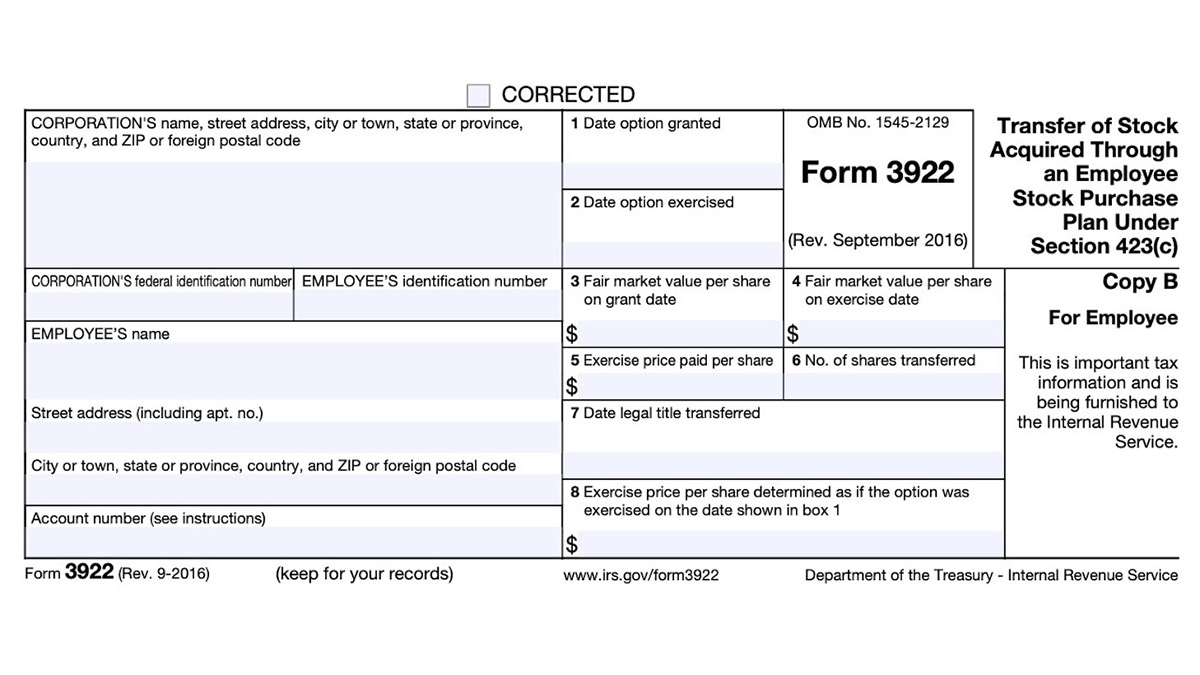

Finance
How To Report House Flipping On A Tax Return
Published: October 29, 2023
Learn how to report house flipping on your tax return and maximize your finances. Make the most out of your real estate investments and save on taxes.
(Many of the links in this article redirect to a specific reviewed product. Your purchase of these products through affiliate links helps to generate commission for LiveWell, at no extra cost. Learn more)
Table of Contents
Introduction
Welcome to the world of house flipping! If you’re someone with an entrepreneurial spirit, a love for real estate, and a desire to generate income, house flipping may be the perfect venture for you. However, it’s important to understand the financial and tax implications that come with this profitable endeavor.
House flipping refers to the practice of purchasing a property, renovating it, and then selling it for a higher price. It can be an exciting and rewarding experience, but it’s crucial to navigate the tax landscape properly to avoid unnecessary penalties or audits from the Internal Revenue Service (IRS).
In this article, we will explore the ins and outs of reporting house flipping on your tax return. We’ll discuss how to report your income, deductible expenses, capital gains taxes, and the correct procedures for filing your tax return. By understanding these key aspects, you can ensure that you comply with tax laws while maximizing your profits.
Before we dive into the specifics, it’s essential to consult with a tax professional or financial advisor who specializes in real estate transactions. They can provide you with personalized advice based on your unique situation and help you navigate the ever-changing tax landscape.
Now, let’s explore the world of house flipping and the steps you need to take to report it correctly on your tax return.
Understanding House Flipping
House flipping involves purchasing a property with the intention of reselling it quickly for a profit. The goal is to buy low, renovate or improve the property, and sell it for a higher price, typically within a short period.
Successful house flippers are well-versed in the real estate market and have a strong understanding of the local market conditions. They know how to identify undervalued properties that have the potential for significant appreciation after renovation. This involves thorough research, analyzing market trends, and networking with real estate professionals.
House flipping is not without its risks. It requires careful planning and financial management. Flippers must have a realistic budget for the purchase price, renovation costs, and holding expenses, such as property taxes, insurance, and utilities. Additionally, they need to accurately assess the after-repair value (ARV) of the property to ensure that the potential profit outweighs the costs.
Timing is crucial when it comes to house flipping. Flippers aim to sell the property as quickly as possible to maximize profits. Holding onto the property for too long increases the chances of incurring additional expenses, such as maintenance and finance costs.
It’s important to note that house flipping is different from long-term real estate investing, where investors hold the property for several years to generate rental income or benefit from long-term appreciation. House flipping is a more active and short-term strategy focused on rapid capital gain.
Now that we have a clear understanding of what house flipping entails, let’s delve into how income generated from house flipping should be reported on your tax return.
Reporting House Flipping Income
When it comes to house flipping, the income you earn from selling a property is considered taxable by the IRS. It is important to accurately report this income on your tax return to avoid any potential issues with the IRS.
The income from house flipping is classified as ordinary income, which means it is subject to the regular tax rates applicable to your income bracket. It is reported on Schedule D (Capital Gains and Losses) of your individual tax return, Form 1040.
The key aspect of reporting house flipping income is determining whether it should be categorized as business income or investment income. This determination depends on the frequency and continuity of your flipping activities. If you regularly engage in flipping properties and it is considered your trade or business, the income will be treated as business income. On the other hand, if house flipping is an occasional activity or not your primary business, the income will be classified as investment income.
If the income is classified as business income, you will report it on Schedule C (Profit or Loss from Business) instead of Schedule D. This allows you to deduct eligible business expenses associated with the flipping activity.
When reporting house flipping income, it is vital to keep accurate and detailed records. This includes documentation of purchase and renovation costs, selling expenses, and any other relevant expenses incurred during the flipping process. These records will help you accurately calculate your net profit or loss and provide supporting documentation in case of an audit.
If you work with a real estate agent or broker to sell the property, you may receive a Form 1099-S (Proceeds from Real Estate Transactions) detailing the sales proceeds. Make sure to include this information when reporting your house flipping income.
Properly reporting house flipping income ensures compliance with tax laws and helps you determine your tax liability accurately. It is advisable to work with a tax professional who can guide you through the process and ensure that you meet all the necessary reporting requirements.
Deductible Expenses in House Flipping
When engaging in house flipping, it’s essential to understand and take advantage of the deductible expenses that can help reduce your taxable income. These expenses are directly related to the purchase, renovation, and sale of the property and can be claimed as deductions on your tax return.
Here are some common deductible expenses in house flipping:
- Purchase Costs: Expenses incurred when acquiring the property, including closing costs, title search fees, and real estate agent commissions.
- Renovation Expenses: Costs related to improving the property, such as materials, labor, permits, and contractor fees. It’s important to keep detailed records of these expenses to accurately calculate your total renovation costs.
- Interest and Financing Costs: The interest paid on loans used to purchase and renovate the property can be claimed as a deduction. Additionally, if you pay points (prepaid interest) to obtain a loan, these can also be deductible.
- Property Taxes: The property taxes paid on the property during the time you own it can be claimed as a deduction.
- Insurance Premiums: The premiums you pay for insurance coverage on the property, such as property insurance and liability insurance, can be deducted.
- Utilities and Maintenance: Expenses for utilities, such as water and electricity, as well as maintenance costs while the property is being renovated, can be considered deductible expenses.
- Advertising and Marketing Costs: Expenses associated with marketing the property for sale, such as online listings, photography, and staging, can be claimed as deductions.
- Professional Fees: If you hire professionals such as real estate agents, appraisers, or attorneys to assist with the house flipping process, their fees can be deducted.
It’s important to note that deductible expenses must be directly related to the house flipping activity and be reasonable and necessary. Keeping accurate records and preserving all receipts and invoices will help substantiate these deductions in case of an audit.
When reporting deductible expenses, they are typically claimed as business expenses on Schedule C if house flipping is considered your trade or business. If it is an occasional activity or not your primary business, the deductions may be claimed as investment expenses on Schedule A (Itemized Deductions), subject to certain limitations.
Consulting with a tax professional is invaluable when it comes to identifying and claiming all eligible deductible expenses. They can help ensure that you take advantage of all available deductions while staying compliant with tax laws.
Capital Gains Tax on House Flipping
One important aspect to consider when engaging in house flipping is the capital gains tax implications. Capital gains tax is the tax levied on the profit made from selling a property or any other capital asset. When you sell a property that you have flipped, the profit you earn is subject to capital gains tax.
The capital gains tax rate depends on the holding period of the property. If you hold the property for less than one year before selling it, the profit is considered short-term capital gains and is taxed at your ordinary income tax rate. Short-term capital gains are generally taxed at higher rates than long-term capital gains.
On the other hand, if you hold the property for more than one year before selling it, the profit is classified as long-term capital gains. Long-term capital gains are generally taxed at preferential rates, which are typically lower than ordinary income tax rates.
It’s important to understand that deductions for eligible expenses, such as renovations and holding costs, can reduce your taxable capital gains. These deductible expenses can help lower your tax liability, allowing you to keep more of your profits.
In addition, there are certain circumstances where you may be eligible for tax benefits related to house flipping. For example, if you meet the criteria for being a real estate professional, you may be able to offset your capital gains with losses from other real estate activities, reducing your overall tax liability.
It is crucial to consult with a tax professional to understand the specific capital gains tax implications for your house flipping activities. They can help you navigate the complex tax laws and ensure that you report your capital gains accurately and take advantage of any available tax benefits.
Now that we have discussed the capital gains tax implications of house flipping, let’s move on to the next section, which covers the filing and reporting requirements for house flipping on your tax return.
Filing and Reporting House Flipping on your Tax Return
Properly filing and reporting your house flipping activities on your tax return is essential for maintaining compliance with the IRS. Here are the key steps to follow:
- Choose the appropriate tax form: Depending on the classification of your house flipping income (business or investment), you will need to use the appropriate tax form. If your flipping activities qualify as a trade or business, use Form 1040 with Schedule C. If it is considered an investment activity, use Form 1040 with Schedule D.
- Report your income: On Schedule C or Schedule D, report the income you earned from selling the flipped properties. Include all relevant details, such as the sales price, date of sale, and any associated expenses.
- Claim deductible expenses: If your house flipping activities qualify as a business, you can deduct eligible expenses on Schedule C. If it is an investment activity, you may be able to deduct expenses as investment expenses on Schedule A, subject to certain limitations. Ensure that you have accurate records and supporting documentation for all claimed deductions.
- Pay attention to depreciation: If you own the property for longer than one year, you may be eligible to claim depreciation deductions. Consult with a tax professional to understand the rules and calculate the correct depreciation amount to report on your tax return.
- Consider estimated tax payments: House flipping activities often generate significant income, leading to a higher tax liability. It’s important to estimate and pay your taxes quarterly to avoid penalties and interest for underpayment.
- Keep thorough records: Maintain organized and detailed records of all your house flipping activities. This includes receipts, invoices, contracts, and any other documentation related to the purchase, renovations, and selling of the properties. These records will be important in case of an audit.
It is highly recommended to work with a tax professional who specializes in real estate transactions to ensure that you meet all the necessary filing and reporting requirements. They can provide guidance on specific tax laws, deductions, and any potential tax benefits that may apply to your house flipping activities.
Now that we have covered the filing and reporting process, let’s move on to the next section, which will highlight common mistakes to avoid when reporting house flipping on your tax return.
Common Mistakes to Avoid
When it comes to reporting house flipping on your tax return, there are several common mistakes that you should be aware of and avoid. By avoiding these mistakes, you can ensure accurate reporting and reduce the risk of facing penalties or audits from the IRS. Here are some common mistakes to watch out for:
- Failure to report all income: It is crucial to report all income generated from house flipping, including any cash transactions. Failing to report income can lead to serious penalties and legal consequences.
- Incorrect classification of income: Properly classify your house flipping income as either business income or investment income. Misclassifying your income can result in improper reporting and potential tax liabilities.
- Neglecting to deduct eligible expenses: Ensure that you accurately track and deduct all eligible expenses related to your house flipping activities. Failing to claim deductions can result in overpayment of taxes.
- Inadequate record-keeping: Keep thorough and organized records of all transactions, including property purchases, renovation expenses, and selling costs. Insufficient documentation can make it challenging to substantiate your deductions during an audit.
- Failure to report property sales on time: Report property sales within the appropriate tax year. Late reporting can lead to penalties and interest charges.
- Ignoring state and local tax obligations: Be aware of any state and local tax obligations related to your house flipping activities. Failure to comply with these obligations can result in additional penalties and legal consequences.
- Not seeking professional advice: House flipping involves complex tax implications. Relying solely on your own knowledge or online resources may lead to mistakes. It is highly recommended to work with a tax professional who specializes in real estate transactions to ensure proper reporting and maximize tax benefits.
Avoiding these common mistakes requires attention to detail, accurate record-keeping, and seeking professional guidance. By taking the time to understand the tax requirements and ensuring accurate reporting, you can navigate the tax landscape confidently and minimize any potential tax issues.
Now let’s address some frequently asked questions about house flipping and taxes.
Frequently Asked Questions
Here are some frequently asked questions about house flipping and taxes:
- Do I need to report every house flip on my tax return?
- What is the difference between short-term and long-term capital gains?
- Can I deduct repair costs as expenses?
- Can I claim a loss if my house flipping project results in a negative profit?
- Do I need to pay self-employment tax on house flipping income?
- What happens if I am audited by the IRS?
Yes, any profit you make from house flipping is considered taxable income and should be reported on your tax return.
Short-term capital gains are profits from selling a property that you held for less than one year. Long-term capital gains are profits from selling a property that you held for more than one year. The tax rates for these gains differ, with long-term gains generally being taxed at a lower rate.
No, repair costs are considered part of the property’s basis and are not deductible as expenses. However, you can include them when calculating the gain or loss on the sale of the property.
Yes, if you sell a property at a loss, you can claim a capital loss on your tax return. However, there are limitations to how much of a loss can be deducted in a given tax year.
If your house flipping activities are considered a trade or business, you may be subject to self-employment tax on the net income. It’s important to consult with a tax professional to determine your specific tax obligations.
If you are audited by the IRS, they will review your tax return and supporting documentation to ensure accuracy and compliance with tax laws. It’s crucial to have thorough records and documentation to substantiate your reported income and deductions.
Please note that these answers are general in nature, and tax regulations can vary. It is recommended to consult with a tax professional to obtain personalized advice based on your specific situation.
Now, let’s wrap up this article.
Conclusion
House flipping can be a lucrative venture, but navigating the tax implications is vital for your financial success. By understanding the process of reporting house flipping on your tax return, you can ensure compliance with tax laws while maximizing your profits.
When reporting house flipping income, accurately categorize it as business income or investment income based on the nature of your activities. Deductible expenses such as purchase costs, renovation expenses, and interest payments can help reduce your taxable income. It is crucial to keep detailed records and consult with a tax professional to ensure accurate reporting and maximize your deductions.
Additionally, be aware of the capital gains tax implications of house flipping and understand the tax rates based on the holding period of the property. Properly reporting your capital gains and considering any available tax benefits can help minimize your tax liability.
Avoid common mistakes, such as failing to report all income, misclassifying income, or neglecting to claim eligible deductions. Thorough record-keeping, timely reporting, and seeking professional guidance are essential to minimize the risk of penalties and audits from the IRS.
Remember, tax laws and regulations can change over time, so staying informed and seeking professional advice is crucial. By following the proper procedures and understanding the tax responsibilities associated with house flipping, you can confidently navigate the tax landscape and focus on your success in the real estate market.
Armed with this knowledge, you can now embark on your house flipping journey with the peace of mind that comes from understanding how to report your activities correctly on your tax return.














